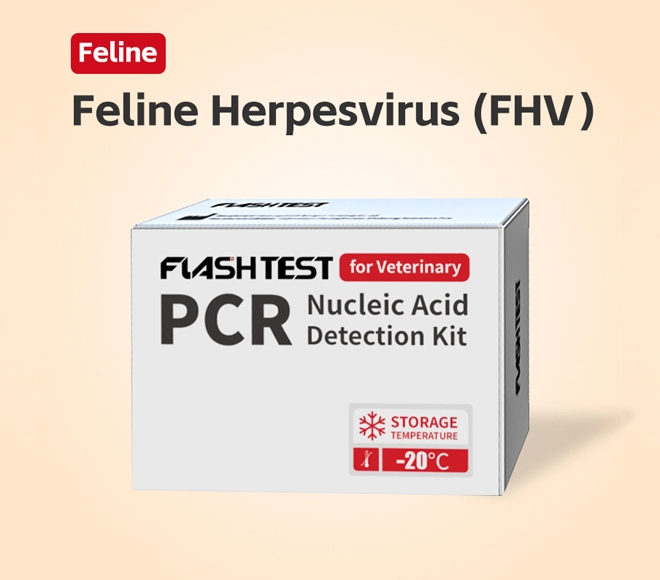Regular health check-ups and tests are essential for maintaining the well-being of our beloved furry friends. Just like humans, animals are susceptible to various health conditions, some of which may stay hidden until they become severe. One such health issue that often goes unnoticed is feline herpes. In this blog, we will explore the importance of feline herpes tests and why they should be conducted regularly.
What is Feline Herpes?
Feline herpes, also known as feline viral rhinotracheitis (FVR), is a highly contagious respiratory infection that affects cats. It is caused by the feline herpesvirus, specifically the herpesvirus 1 (FHV-1). This infection can affect cats of all ages and breeds, making it a significant concern for cat owners and veterinarians alike.

Symptoms of Feline Herpes
Feline herpes can manifest itself in various ways, and the severity of the symptoms can vary from cat to cat. Some common symptoms include:
Sneezing and nasal discharge
Runny eyes or conjunctivitis
Coughing
Fever
Loss of appetite
Ulcers on the nose or around the mouth
Lethargy
These symptoms may resemble those of a common cold, making it difficult to identify herpes as the cause. However, a thorough examination by a veterinarian, including a feline herpes test, can help confirm the presence of the virus and guide proper treatment.
The Importance of Feline Herpes Tests
Feline herpes tests play a crucial role in identifying the presence of the virus in cats, especially those that show no apparent symptoms. By detecting the virus early on, veterinarians can initiate appropriate treatment and prevent the infection from spreading to other cats. Regular testing is particularly essential for cats in multi-cat households, catteries, or rescue organizations where the risk of transmission is higher.
Moreover, herpes tests are also beneficial for breeding cats. FHV-1 can cause pregnancy-related complications, including abortion or stillbirth. By testing breeding cats, responsible breeders can take preventive measures to protect the health of the mother and the unborn kittens.
Recommended Testing Frequency
Now that we understand the importance of feline herpes tests, let's discuss how frequently they should be conducted. Since the virus can remain latent in a cat's body and flare up during times of stress, periodic testing is crucial, even for seemingly healthy cats.
For cats with a known history of feline herpes, it is recommended to conduct a test at least once a year, or as advised by a veterinarian. This ensures that any flare-ups are detected early and that appropriate treatment can be administered promptly.
If you have multiple cats in your household, it is advisable to test all the cats, even those without visible symptoms, to prevent the spread of the virus. Testing should also be a priority if you are bringing a new cat into a household with existing cats.
In conclusion, understanding the importance of feline herpes tests is crucial for keeping our feline companions healthy. Regular testing helps in early detection, appropriate treatment, and prevention of the virus from spreading to other cats. As responsible pet owners, let's prioritize the health and well-being of our furry friends by scheduling regular feline herpes tests and seeking guidance from our veterinarians.
Remember, a simple feline herpes test today can ensure a healthier and happier tomorrow for our beloved cats.
Related Animal Lab Test Products
-
-
- Dry Chemistry Analyzer
- Compact Fully Automated Immunofluorescence Analyzer
- Economical Immunofluorescence Analyzer
- Handheld Immunofluorescence Quantitative Analyzer
- High-Speed Fully Automated Immunofluorescence Analyzer
- Semi-Automated Immunofluorescence Analyzer
- Immunofluorescence Analyzer + Incubator
- Handheld Immunofluorescence Quantitative Analyzer


![[2043]Feline serum amyloid A (fSAA) [2043]Feline serum amyloid A (fSAA)](/uploads/image/20250112/11/Feline-serum-amyloid-A-fSAA-Test-Kit.webp)
![[3503]Avian Influenza H7 (AIV-H7) [3503]Avian Influenza H7 (AIV-H7)](/uploads/image/20250113/11/Avian-Influenza-H7-AIV-H7-Nucleic-Acid-Test-Kit-Lyophilized.webp)
![[3516]Mycoplasma synovial cystis (MS) [3516]Mycoplasma synovial cystis (MS)](/uploads/image/20250113/11/Mycoplasma-Synovial-Cystis-MS-Nucleic-Acid-Test-Kit-Lyophilized.webp)